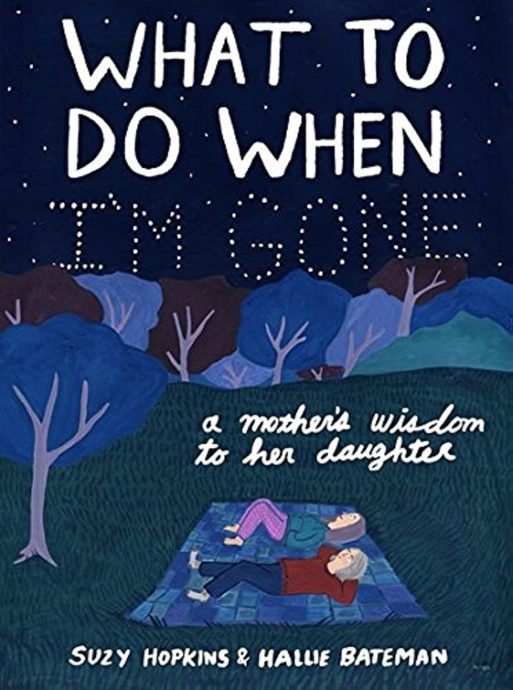 Can a book about death be laugh-out-loud funny? Can an instruction manual on what to do when you lose your mother be quirky and charming, witty and wise, painful and poignant? You bet. Suzy Hopkins and Hallie Bateman’s book, “What To Do When I’m Gone: A Mother’s Wisdom to Her Daughter” will have you sniffling and smiling in equal measure.
Can a book about death be laugh-out-loud funny? Can an instruction manual on what to do when you lose your mother be quirky and charming, witty and wise, painful and poignant? You bet. Suzy Hopkins and Hallie Bateman’s book, “What To Do When I’m Gone: A Mother’s Wisdom to Her Daughter” will have you sniffling and smiling in equal measure.
“What To Do When I’m Gone” came about when Hallie Bateman was in her early twenties. She was hit by the realization that someday her mom, Suzy Hopkins, would die and she would have to get through life without her. Hallie, an illustrator and writer, talked to her mother about her fears. Suzy, a newspaper journalist and founder of a magazine for seniors and boomers, decided to address those fears head-on and tell Hallie what to do when she died. Together, they collaborated and created a memorable, meaningful book filled with whimsical drawings and funky wisdom.
Practical, Poignant Heartfelt Advice About Getting Through Grief
But it wasn’t just a book about telling her daughter how to get through grief. Suzy was recording heartfelt pieces of advice to help Hallie get through life, all the way through old age and up to the end of Hallie’s life.
Starting at the day of her death, the book works forward through time, giving a piece of advice for a daughter to follow every day of the first week. On Day One, Hopkins commands her daughter to make fajitas. “Slice a giant pile of sweet onions. You’ll be crying anyway.” After the cooking is done, Suzy asks Hallie, “Now don’t you feel better? Of course you don’t. Pour yourself a big glass of whiskey.”
I can’t tell you how many times I laughed out loud when reading this book. From the advice about brushing the dog on Day Three, to the advice about what NOT to include in the obituary, to advice about how not to respond when someone says something stupid like, “Time heals all wounds.” (The author advises against saying what you think: “So how long, exactly, before she’s alive again?”) Suzy Hopkins’ honest, humorous, heart-wrenching words span the gamut of emotions during the grieving process.
Wisdom Not Just About Getting through Grief But Getting Through Life
Sometimes, I felt the book speak directly to me. Like on Day #850, there is an entry titled, “Talk to Me.” Hopkins tells her daughter, “You’ll see something and think, ‘Mom would have loved this.’ Maybe you’ll be walking on a beautiful beach and suddenly remember how much I loved our trips to the ocean. Or you’ll get a great new job or meet someone wonderful, and you’ll feel sad you can’t talk to me. But you can.”
My own mother died just a little over a year ago, but I heard her voice coming through loud and clear in Suzy Hopkins’s words. “The world will disappoint you. You’ll be stunned by war, intolerance, hate, greed. You’ll want a quick solution, but there isn’t one. Try to counter those wrongs by putting forth something positive, however small.”
Advice on relationships, sex, childbirth, jobs and aging are dispensed with a dollop of wisdom, a helping of humor, and a smattering of family recipes that float through the illustrated pages and transcend both grief and time.
“Death is Not a Subtraction”
In “What To Do When I’m Gone,” a mother reminds her daughter that “death isn’t just subtraction. You’re left with a treasure of memories that can be triggered by sights, sounds, smells — a record of how my life enriched yours.”
“What to Do When I’m Gone: A Mother’s Wisdom to Her Daughter” has got me thinking. What advice do I want to give my own daughters on how to carry on when I’m gone? No matter what I want to tell them, I couldn’t say it any better than Suzy Hopkins and Hallie Bateman, so I’ll just buy copies to pass on.

 “What to Do When I’m Gone: A Mother’s Wisdom to Her Daughter” by Suzy Hopkins and Hallie Bateman
“What to Do When I’m Gone: A Mother’s Wisdom to Her Daughter” by Suzy Hopkins and Hallie Bateman



 Funeral Favors Offer Visitors a Tangible Memento
Funeral Favors Offer Visitors a Tangible Memento
 “Comeback” by Prince
“Comeback” by Prince















